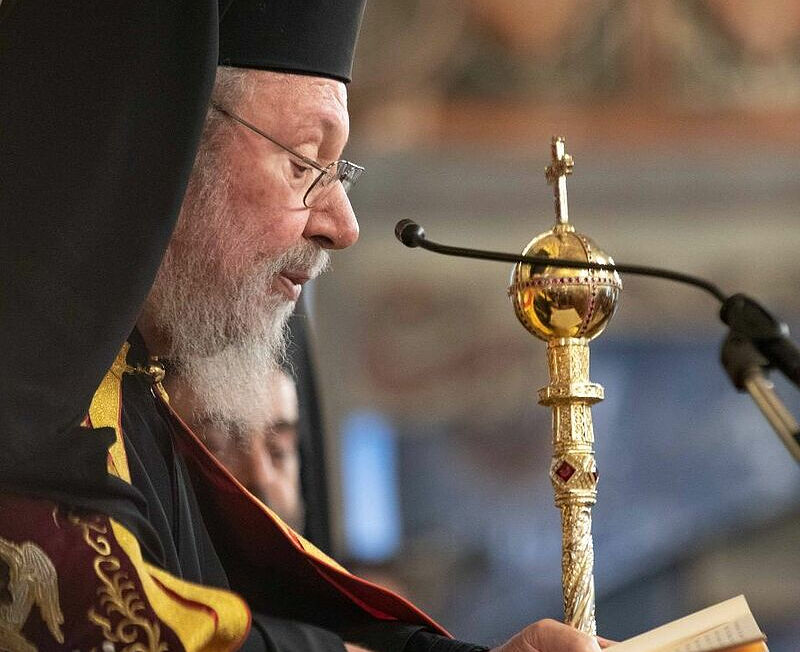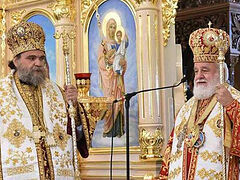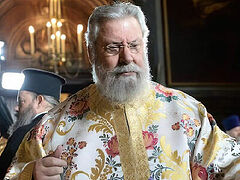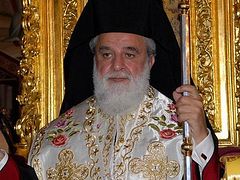Nicosia, Cyprus, November 13, 2020
Archbishop Chrysostomos of Cyprus has announced that the Holy Synod will meet on November 23 to discuss the present scandal in the Cypriot Church surrounding his unilateral decision to commemorate the schismatic Epiphany Dumenko in the Divine Liturgy.
The Cypriot primate also expressed his dismay and hurt over the fact that four of his brother bishops have responded to his decision, according to their hierarchical conscience, as they have said. He earlier accused them of forming a “parasynagogue” in the Church by coming together to address him in an open letter.
But although it wounds him to receive a response to his decision, the Archbishop nevertheless forgives the bishops, he states.
In an interview with Alpha Cyprus, the text of which is published on the official Church of Cyprus website, the Archbishop explains that he is summoning the Synod himself, even though, as he says, no bishops requested it. Since no request came, he was planning to travel to Greece for treatment of his bad leg, but his doctor advised him against it due to the pandemic. Since he wasn’t going to Greece, he decided to convene the Synod, so the issue wouldn’t remain during the Nativity and Theophany season.
However, the Archbishop also clarifies that he has no intention of putting the issue of commemorating Epiphany Dumenko up to a Synodal vote. Rather, he will continue with his unilateral decision, but wants the opportunity to explain his decision to the bishops.
Recall that the Archbishop earlier stated that he intentionally avoided telling his brother hierarchs about his decision so as to avoid a fight.
Despite his poor health, he met to discuss the Ukrainian issue with 9 of the Orthodox primates, and he knows the views of all the primates on the matter, he states.
And, “If anyone carefully studies my letter to His All-Holiness, if everyone would listen to me, then Orthodoxy would have no problems, and it could become an example for other confessions to follow. And the Church of Cyprus would stand very high,” the Archbishop confidently states.
The Cypriot primate often mentions that he represented the Church of Cyprus at pan-Orthodox conferences and councils for 30 years and thus has a good understanding of where all the Local Churches stand on the Ukrainian and autocephaly issues. Nevertheless, he also states that it was only after visiting Constantinople in March “that I learned the whole truth about this issue, because before that I only knew half of it, and His All-Holiness explained to me that Ukraine belongs to the Ecumenical Patriarchate, which handed it over to the Moscow Patriarchate only to temporarily manage it, because of Moscow’s proximity to Ukraine.”
This take on history is disputed by the Ukrainian Orthodox Church, the Moscow Patriarchate, and most Local Churches, but Pat. Bartholomew refused Moscow’s proposal to formally discuss the history of the Kiev Metropolis’ transfer to the Russian Church and the relevant documents.
According to Abp. Chrysostomos, “at the beginning of the 17th century, moving from Constantinople to Ukraine was difficult. Since 1917, with the beginning of communism in Russia, the Ecumenical Patriarch was no longer commemorated. But when communism fell, the Ecumenical Patriarch wanted to restore the original order in Ukraine, but the Russians refused.”
And there are many other details that he cannot tell now, the Archbishop said.
The Archbishop crystallized his position on the matter after visiting Constantinople in March, but, as he claims, there was no time to discuss the matter with the Holy Synod, so he simply went ahead and started commemorating Epiphany Dumenko. However, as other bishops have revealed, the matter was, in fact, discussed by the Holy Synod in both September and October, resulting in the Archbishop promising his brother hierarchs that he would not commemorate Dumenko.
While the Archbishop revealed his decision publicly at a Divine Liturgy, he states that he was shocked that the four bishops—Metropolitans Athanasios of Limassol, Nikiforos of Kykkos, and Isaiah of Tamassos, and Bishop Nicholas of Amathountos—issued statements to the public. “They knew that my door was open… I would have apologized to them for the trouble I caused and would have explained to them in detail.”
The Archbishop characterizes the bishops’ open letter as an “attack,” saying they came after him “for no reason.”
“If I had killed their parents or siblings, they wouldn't have done this to me. They poured out acid and bile. I haven't done anything to them to justify this hostility,” Abp. Chrysostomos states.
However, after characterizing the bishops as a selfish and conspiratorial parasynagogue, he remains the merciful archpastor: “In any case, I forgive them. I have nothing against them, and I am at their disposal.”
While the other bishops serve their own selfishness and foreign interests, he believes, the same cannot be said of him, he assures: “No one can accuse me of coming here for fun. I had everything; I wasn’t look for anything when I came to the Archdiocese. I had it much better in Paphos.”





